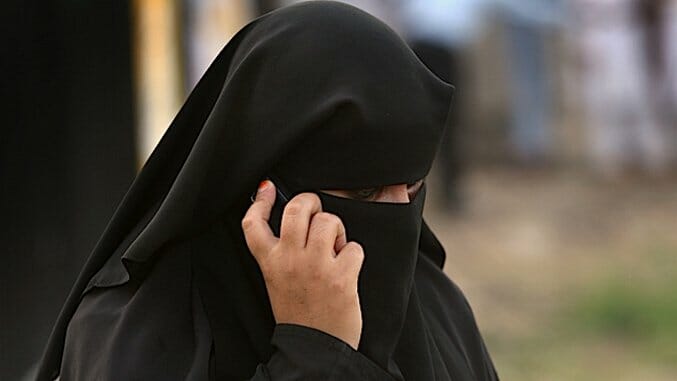The Merkel Burqa Ban: Criminalizing Islam in Germany
The populists in Europe don’t want to see Muslim faces. They want to replace one veil with millions more.
Photo by John Moore/Getty
Angela Merkel, speaking Tuesday at the Christian Democrat party conference, gave her support to a proposed ban on Islamic face veils in Germany, calling them “not appropriate here” and saying they should be banned in the country “wherever legally possible.” The ban is backed by right-wing nationalists and an increasing number of populists grown fearful of immigrants. The proposal was prompted after an Afghan teenager who sought asylum in the country raped and murdered 19-year-old college student Maria Ladensburger this October.
This signals an abrupt shift to the right for Merkel, who just last year opened Germany to over a million asylum-seekers, most of them Muslims from regions ravaged by war. That humane decision, though — the “Welcome Policy” — was immediately savaged by far-right and nationalist groups, and soon enough, a pretty big portion of the public.
Merkel — a conservative who’s been Germany’s Chancellor since 2005 — is again up for re-election next year. She’s going to have to take up what’s now become an all too familiar fight against a surge of far-right nationalism in her party. She’s probably most worried about the far-right Alternative for Germany party (AfD), which won a startling 145 seats in the latest state elections and touts an extreme anti-Islamic platform that calls for bans on face veils, minarets, calls to prayer, and other Islamic symbols and practices. Their slogan: “Islam is not part of Germany.”
This is probably the first of many signals Merkel will send to her base in coming months as she dusts off her conservative credentials and tries to shore up more support from the right, so it’s unclear whether she’s being cynical or serious. No matter — there’s a lot more to it when you look closer. The ban is about much more than politics, violence, or terrorism. It about much more than women’s rights, even. It’s about identity — what it means to be German or European.
I’ll go further: It’s about what it means to be human. Given the history in that part of the world, this terrifies me. I know that sounds sensational and clickbaity, but let me explain. See if you agree.
What the ban will do
First of all, the ban wouldn’t do much. There are a little less than five million Muslims in Germany, and experts estimate that none of them wear a burqa, which covers not just the full body but has a beekeeper-ish mesh over the eyes as well. And only a few hundred Muslim women in the country wear another traditional full-face veil, called the niqab. Then there’s the hijab, which is the headscarf alone — no veil. That’s far and away the most popular.
Burqa bans have bounced around Europe for a while. This summer the mayors of several towns in France banned “burkinis,” prompting a major backlash in France and the U.K. before those laws were overturned by the French courts. And to be completely honest, the burqa itself — with its masked eyes — does invoke a reflexive, visceral unease in me before reason takes control. Not proud, but it’s true. It’s something about the covered eyes. There’s an “uncanny valley” effect, I guess. It doesn’t bother me in a cultural sense.
Still, even if the ban is passed, it would affect so few Muslim women that hardly anyone aside from those directly affected would notice. But that doesn’t matter to the far right, because it was never about Muslim women, anyway.
These nationalist messages resonate with voters who see Merkel’s “Welcome Policy” (which has since been halted) as a huge mistake. Many cite violent crimes committed by asylum-seeking immigrants, such as during the New Year’s celebrations in Cologne when an estimated 1,000 women were reportedly sexually assaulted. This week the German government prompted a backlash when it warned the public not to respond to Ladensburger’s murder by attacking or marginalizing immigrants. This also led to accusations — familiar to us in the U.S. — that the media, which didn’t broadcast the story in main headlines, was sacrificing security in the name of political correctness. The next day another asylum-seeker was charged for raping two students.
This merely proves that asylum-seekers are just as capable of committing heinous crimes as anyone else. More to the point, perhaps, is the recent series of terrorist attacks in Germany carried out by asylum-seekers inspired by but unaffiliated with the Islamic State. A shooting outside a McDonald’s at a Munich mall resulted in nine deaths. A suicide bomber injured 15 at a concert. There’s also been a run of knife attacks, which are terrifying to think about.
-

-

-

-

-

-

-

-

-

-

-

-

-

-

-

-

-

-

-

-

-

-

-

-

-

-

-

-

-

-

-

-

-

-

-

-

-

-

-

-








































